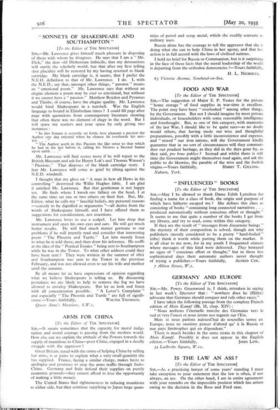" SONNETS OF SHAKESPEARE AND SOUTHAMPTON "
[To the Editor of THE SPECTATOR]
Sut,—Mr. Lawrence gives himself much pleasure in disposing of those with whom he disagrees. He says that I am a " Mr. Dick," the dear old Dickensian imbecile, that my detonations will startle the scholarly world, but -that after my first telling shot placidity will be restored by my having resorted to blank cartridge. My blank cartridge is, it seems, that I prefer the N.E.D. definition to that of Mr. Lawrence. I do. I, with the N.E.D., say that, amongst other things, " passion " means an " emotional poem." Mr. Lawrence says that without an elegiac element a poem may be ever so emotional, but without it we cannot have a " passion." Matthew Roydon and Pyramus and Thisbe, of course, have the elegiac quality. Mr. Lawrence would bind Shakespeare in a nutshell. Was the English language so bound in Elizabethan times ? I could fill page after page with quotations from contemporary literature showing that often there was no element of elegy in the word. But I will spare my readers and your space by only giving two instances :
" In this Sonnet is covertly set forth, how pleasant a passion the Author one day enjoyed when by chance he overharde his mis- tris . . . "
" The Author useth in this Passion the like sense to that which he had in the last before it, calling his Mistres a Second Sunne upon earth . . ."
Mr. Lawrence will find scores more if he will repair to the British Museum and ask for Henry Lok's and Thomas Watson's " Passions." That disposes of the blank cartridge story. I fear Mr. Lawrence will come to grief by tilting against the N.E.D. windmill.
I thought that my gloss on " A man in hew all Hews in his controlling " destroyed the Willie Hughes fable. I am glad it satisfied Mr. Lawrence. But that gentleman is not happy yet. He finds where I knock one fallacy on the head, I at the same time set one or two others on their feet. But, Mr.
Editor, what he calls my " fanciful beliefs, my personal reasons —scarcely to be dignified as arguments "—all derive from the words of Shakespeare himself, and I have offered them as suggestions for consideration, not assertions.
Mr. Lawrence loves to use a scalpel. Let him drop that instrument and open his own eyes and ears. He will get much better results. He will find much matter germane to our problems if he will intently read and consider that interesting poem " The Phoenix and Turtle." Let him merely listen to what he is told there, and then draw his inference. He scoffs at the idea of the " Poetical Essaies " being sent to Southampton while he was in the Tower. To what other address could they have been sent ? They were written in the summer of r6or and Southampton was sent to the Tower in the previous February, and was not allowed even to see his wife and mother until the autumn.
By all means let us have expressions of opinion regarding what we believe Shakespeare is telling us. By discussing postulates we are likely to help to remove the fog we have allowed to envelop Shakespeare. But let us look and listen with all concentration possible. " A Lover's Complaint " and especially " The Phoenix and Turtle " are full of signifi- Queen Anne's Mansions, S.W.z.


















































 Previous page
Previous page